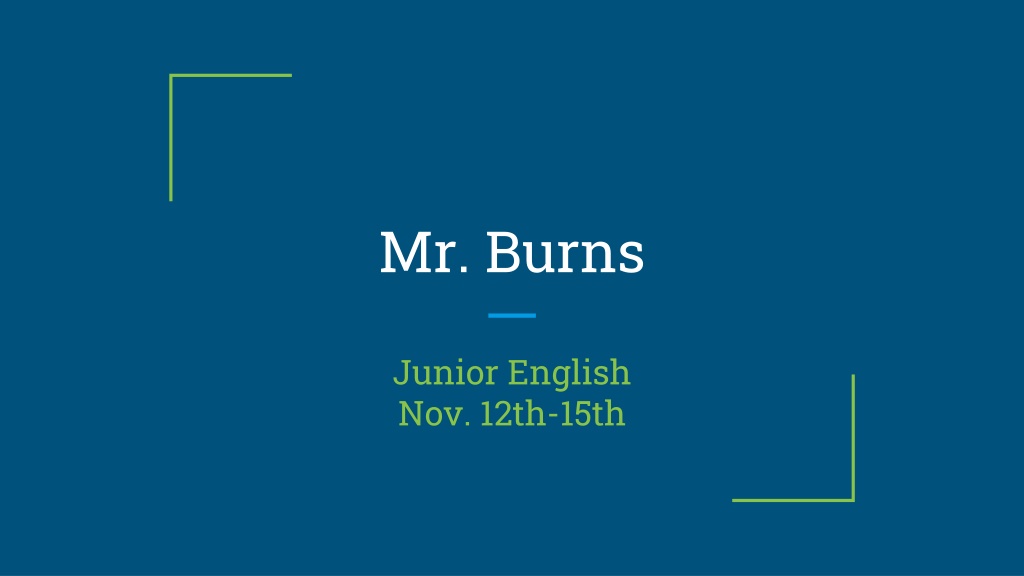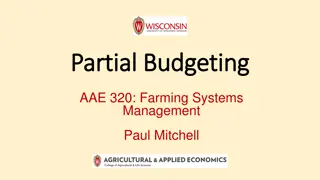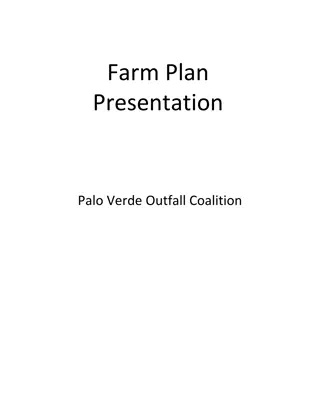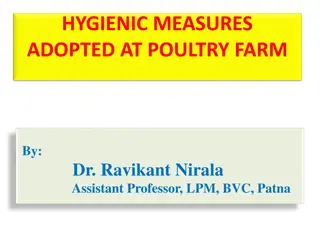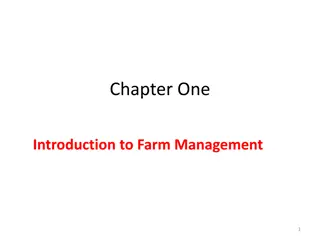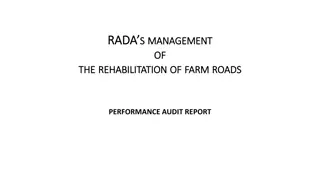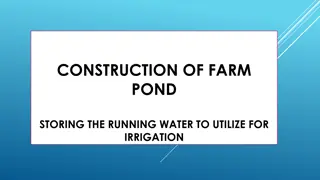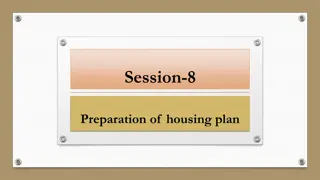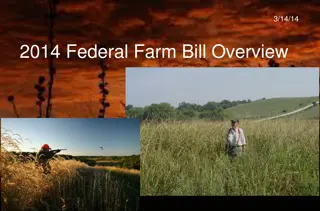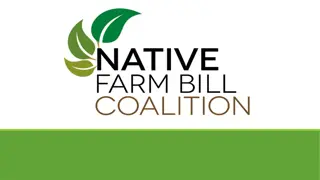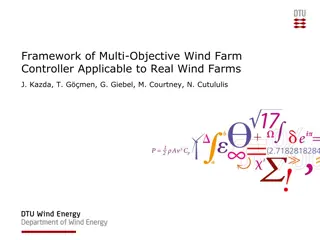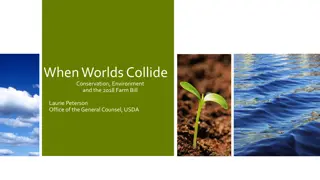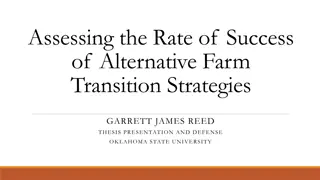Overview of 2014 Farm Bill Programs and Options
The 2014 Farm Bill introduced new programs like PLC and ARC, offering farmers options to manage risk, update base acres, and payment yields. Payments calculated using MYA prices are issued the following October.
Download Presentation

Please find below an Image/Link to download the presentation.
The content on the website is provided AS IS for your information and personal use only. It may not be sold, licensed, or shared on other websites without obtaining consent from the author. Download presentation by click this link. If you encounter any issues during the download, it is possible that the publisher has removed the file from their server.
E N D
Presentation Transcript
Mr. Burns Junior English Nov. 12th-15th
Tuesday, November 12th, 2019 Question of the Week: Claim: I think a school dress code is wack because we live in Arizona and it gets hot and because dress codes restrict my rights to express myself and to express my uniqueness. Also, the administrators are dumb for making a dress code. Create a more logical, rational, adult-sounding claim for this student.
Conclusion Paragraph 1: Address the opposition to these solutions Paragraph 2: Emphasize your claim Consider YOUR next steps in implementing a plan that will contribute to a solution. Consider addressing each element of the SMART Goal acronym. How will you:
SMART Goal Acronym Specific-what exactly do you hope to accomplish? Measureable--How will you measure your success? Achievable--What actions do you anticipate needing to complete? Realistic--Why is this realistic and/or sustainable? Time-bound--When will you start/complete some of the action-items on your list? **Due next Tuesday. Just print out this section and nothing else.
Group Memorization 1. Active voice is when the subject always does the action of the sentence. Chronologically, the subject will come before the verb in the sentence. 2. Passive voice is when something that is ordinarily done by the subject of a sentence is done by the object of a sentence. 3. A preposition is a word usually preceding a noun or pronoun and expressing a relation to another word or element in the clause. 4. An appositive is a noun or a noun phrase that is next to another noun to rename it or to describe it in another way. 5. An infinitive is the verb in its basic form. The infinitive form of a verb is usually preceded by to, but not always. 6. A participial is a word formed from a verb which can be used as an adjective. Remember adjectives modify nouns.
Examples 1. 2. The reading was completed by Mr. Burns. 3. Mr. Burns teaches American Literature at Basha High School. 4. Mr. Burns, the one with the auburn colored beard, teaches American Literature at Basha High School. 5. Mr. Burns really wants his students to read outside of class. 6. Present Participial Phrase and Past Participial Phrase a. Wearing his navy blazer, Mr. Burns walked into class. b. Prepared to meet the students, Mr. Burns walked into the classroom. Mr. Burns taught the class.
Transcendentalist Based on our readings so far, what is a transcendentalist? Henry David Thoreau s Where I Lived, and What I Lived For Walt Whitman s O Captain! My Captain! Let s discuss!
What is transcendentalism? A core belief was in the inherent goodness of both people and nature. They believed that society and its institutions ultimately corrupted the purity of the individual, and had faith that people are at their best when truly "self-reliant" and independent. https://infogalactic.com/info/Transcendentalism
Ralph Waldo Emerson (The Leader) The man, the myth and the legend. Where I was born? Boston, MA Who am I? Let me tell you. Was I product of my age or a reformer of my age? http://www.gutenberg.org/files/31133/31133-h/31133- h.htm#Page_133
Ralph Waldo Emerson s Excerpts from Self Reliance
Wednesday/Thursday, November 13th/14th Bell-work: Growing Roots Wednesdays The Latin/Greek root for today is preter which means past or beyond. Section 3: The word you will use to breakdown is preterite, which means expressing a past action or state. Please complete the Growing Roots worksheet. 15-minutes
Question of the Week Claim: I think a school dress code is wack because we live in Arizona and it gets hot and because dress codes restrict my rights to express myself and to express my uniqueness. Also, the administrators are dumb for making a dress code. Create a more logical, rational, adult-sounding claim for this student.
Group Memorization 1. Active voice is when the subject always does the action of the sentence. Chronologically, the subject will come before the verb in the sentence. 2. Passive voice is when something that is ordinarily done by the subject of a sentence is done by the object of a sentence. A preposition is a word usually preceding a noun or pronoun and expressing a relation to another word or element in the clause. Common prepositions are on, at, of, across, to, under, with An appositive is a noun or a noun phrase that is next to another noun to rename it or to describe it in another way. An infinitive is the verb in its basic form. The infinitive form of a verb is usually preceded by to, but not always. A participial is a word formed from a verb which can be used as an adjective. Remember adjectives modify nouns. 3. 4. 5. 6.
Underline the phrase and identify the type Directions: Rewrite the sentences in your notebook. Underline either the prep.,app.,inf., or part. phrase within the sentence. Then identify which type of phrase it is. 1. Working hard for a year, Gladys saved enough money for a cruise. 2. Servette, who worked at the corner candy store, always gives samples. 3. To accept stolen goods is a criminal offense. 4. One of my favorite sports is football. 5. Frank wants to wait here for Mary. 6. Bonnie, my cousin, lives on a farm. 7. Getting hungry, the hikers stopped for lunch. 8. Tommy threw the ball over the fence.
Answers 1. Working hard for a year,... a. Participial phrase ...,who worked at the corner candy store,... a. Appositive phrase To accept . a. Infinitive phrase ...of my favorite sports.. a. Prepositional phrase ...to wait a. Infinitive phrase ,my cousin,... a. Appositive phrase Getting hungry,... a. Participial phrase ...over the fence a. Prepositional phrase 2. 3. 4. 5. 6. 7. 8.
Discussion Questions 1. How do Americans tend to think? 2. How do Americans tend to think of the past?
Ralph Waldo Emerson s Excerpts from Self Reliance
Reading and Annotating As I read aloud, please underline any interesting sentences from Ralph Waldo Emerson s Self Reliance. Also, write a question you would ask Emerson about his philosophical beliefs explained in the first 4 paragraphs of Self Reliance. There is a time in every man s education when he arrives at the conviction that envy is ignorance; that imitation is suicide; that he must take himself for better, for worse, as his portion, that though the wide universe is full of good, no kernel of nourishing corn can come to him but through his toil bestowed on that plot of ground which is given to him to till. (paragraph 1)
from Self Reliance Vocabulary Proportionate (P. 1): proper relation between things or parts Piquancy(p. 3): agreeably stimulating, interesting, or attractive Muse (P. 1): to meditate on Nonchalance (p. 4): cool indifferent or unconcerned Providence (P. 2): a manifestation of divine care or direction Conciliate(p. 4): to lead or draw to by moral influence or power Disconcerted (p. 3): bewildered or confused, as by something unexpected clat(p. 4): brilliant display or effect Prattle (p. 3): to talk in a foolish or simple-minded way; chatter; babble; or brabbled Lethe (p. 4): Oblivion
Friday, November 15th, 2019 Students will complete the Grammar Quiz Writing Quiz Students are allowed to use their notes. Notes include the definitions for active and passive voice, prepositional phrase, infinitive phrases, appositive phrases, and participial phrases. In addition, students wrote notes on examples for each concept. Composition Book Check: Tuesday: Question of the Week Wednesday/Thursday: Growing Roots; Underline and identify the type of phrase
Prepositions To, for, from, aboard, about, above, across, after, against, along, amid, among, at, before, behind, below, beneath, beside, besides, between, beyond, by down, during, in, into, of, off, on, over, past, toward, towards, up, underneath, under, with, within
